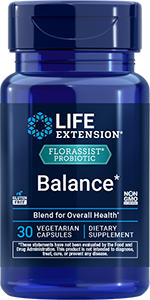
Prebiotics and Probiotics: How They Work Together
Published: April 2024
Did you know everyone is born with their own unique microbiome?
The human microbiome is a collection of living bacteria, viruses, fungi and protozoa. The quantity and composition of these different microbes can fluctuate depending on your lifestyle choices, nutrition and age.
For the most part, the living microbes are beneficial to your health. But some of them are harmful. It's important to keep the microbiome in check so you stay healthy. One of the most powerful ways to keep a favorable balance of good microbes is to consume prebiotics and probiotics.
Prebiotics and probiotics significantly influence the microbiome in different ways. And when you combine the two together, the effects can take your health to the next level.
The microbiome backstory
Let's start with a little review of the microbiome. There are about as many microorganisms living on and inside the body as there are human cells, which is what makes the microbiome such a fascinating part of human health. Scientists have long been familiar with various human microbes, but in 2007, the National Institutes of Health (NIH) launched the Human Microbiome Project (HMP) to explore several living microbes—the good as well as the bad.
As a result, the HMP has brought to light a number of valuable insights, including several different associations between nutrition and the microbiome makeup. While there is still much to learn, we already have plenty of substantial evidence illustrating how prebiotics and probiotics can benefit the microbiome and, therefore, support various aspects of a healthy body.
What do prebiotics and probiotics do?
Prebiotics and probiotics are not quite as similar as their names sound, and it's important to understand their differences. Let's define both of these more clearly and run through all the ways they help promote your health and well-being.
Prebiotics
Prebiotics are food components—often carbohydrates—that are partially or completely indigestible by the human body. (And just to be clear: "indigestible" does not mean "bad" or "unhealthy"—quite the contrary.) Researchers offer a more formal definition of prebiotics: a selectively fermented ingredient that allows specific changes, both in the composition and/or activity in the gastrointestinal microflora that offers health benefits.
These types of prebiotics come from plants and include compounds like inulin, resistant starch and some polyphenols. Legumes, fruits, vegetables, nuts and whole grains are excellent sources of complex carbohydrates and, thus, good sources of prebiotics.
More specifically, you can increase your prebiotic intake with the following foods:
- Asparagus
- Jerusalem artichokes
- Bananas
- Barley
- Beans
- Chicory root
- Flaxseeds
- Garlic
- Leeks
- Oats
- Onions
- Walnuts
How can prebiotics be beneficial if we don't digest or absorb them? Indeed, they do play an important role in digestive health and other aspects of health, partly because prebiotics serve as a valuable fuel source for good bacteria in the gut. In fact, a review of inulin-type prebiotics says that prebiotics are able to selectively stimulate the growth of health-enhancing types of gut bacteria. Simply put, when you consume prebiotic foods, your good gut microbes feed on them and flourish. An increase in good microbes means less room for the bad and a much healthier microbiome.
As an added bonus: many prebiotics are considered dietary fiber. Not all dietary fibers act as prebiotics, and not all prebiotics are fiber, but both are found in plant foods like fruits, vegetables and whole grains—all excellent sources of fiber. And as The Academy of Nutrition and Dietetics concluded, higher intakes of dietary fiber correlate with better health and have been associated with lower body weight.
Explore Our Best Digestive Health Supplements
Probiotics
While many people think of probiotics as the healthy bacteria that live in your digestive tract, the first thing to note is that probiotics are not just bacteria. They are live microorganisms that include bacteria and yeast. Secondly, probiotics do not, in fact, originate in your gut.
Probiotics come from the food, beverages and supplements you consume. Foods and drinks that provide probiotics are most often found in the refrigerated section of your grocery store.
Increase your probiotics intake with the following foods:
- Kefir
- Kimchi
- Yogurt
- Fermented soy foods (natto, miso, tempeh)
Important to note: there is a common misconception that all fermented foods (like kombucha and fermented vegetables like sauerkraut) are considered probiotic foods—but many don't actually contain live cultures. Remember to check the labels on what you consume to ensure the foods you are eating actually contain probiotics.
When consumed in sufficient quantities, probiotics can promote health in a number of ways. That's right, probiotics are not just for gut health. Different probiotic strains benefit different parts of the body—from your brain to your heart to your reproductive and immune system.
Prebiotics vs. probiotics: Is one better than the other?
You will find abundant research that exhibits and supports the addition of probiotics to a healthy diet—and for good reason. Probiotic strains are beneficial to gut health. But the same can be said for prebiotics. By feeding prebiotics to the healthy microbes that already live in your gut, you create a safe and thriving environment.
Put another way: you can add to the good bacteria in your gut or you can optimize what's already there. One thing is not better than the other. Most experts would argue it's best to do both, which is why prebiotics and probiotics are such a dynamite duo.
Should you take prebiotics and probiotics together?
Even if you don't eat sauerkraut sandwiches every day, your diet likely already provides a mix of both prebiotics and probiotics. So, yes, it is perfectly safe and acceptable to take them together. This is true for any form, whether you get the gut-friendly goods from food, drinks or supplements.
What is the best prebiotic and probiotic combination?
There is no right answer to this question because everyone's health needs will vary somewhat. The best prebiotic and probiotic combination is the one that's backed by scientific research and supports your specific health needs. That means reading the label and checking to see which probiotic strains are most abundant in that particular food product or supplement formula.
Lactobacillus rhamnosus CRL-1505, for one, is known to support a healthy immune system, while Lactobacillus plantarum ROSELL® A has been scientifically studied to promote optimal vaginal health. If your health needs go beyond any one area, look for a blend of multiple probiotic strains, which can include Lactobacilli and Bifidobacteria species, and keep in mind that different probiotic strains support different aspects of health.
This concept applies to prebiotics, as well. Researchers have discovered specific prebiotics offer specific health benefits. For example, xylooligosaccharide (XOS) is a type of prebiotic derived from non-GMO corn cobs and has been shown to promote levels of Bifidobacteria.
Bifidobacteria is a group of bacteria that have a long clinical track record for supporting gut health. Unfortunately, levels of Bifidobacteria dramatically decline with age. Those who want to prioritize their overall health might want to combine probiotic blends with an XOS prebiotic formula to optimize potential Bifidobacteria growth in the body.
Should you refrigerate probiotic supplements?
Probiotic supplements do not need refrigeration unless the label specifically instructs you to do so. Despite clever marketing tactics, refrigerating probiotic supplements does not make the formula more valuable.
Should you take prebiotics in the morning or at night?
Some supplements are very picky. Fat-soluble vitamins, for instance, should be taken with a meal that includes fat in order to maximize your body's absorption of these nutrients. Thankfully, prebiotics and probiotics are not high maintenance.
You can take prebiotic and probiotic supplements whenever it is most convenient for you. Whether you choose morning, noon or night, with or without food, their effectiveness will not be altered.
Of course, most health experts will tell you to prioritize food over supplements. That means adding more food sources of prebiotics and probiotics to your diet, which you can, certainly, eat any time of day—and you should!
Feeling overwhelmed by all the possible choices? Use our digestive health quiz to help you customize the right combination of supplements for your body.
References
- Bevilacqua A, et al. "An Update on Prebiotics and on Their Health Effects." Foods. January 2024. https://pubmed.ncbi.nlm.nih.gov/38338581/
- Dahl WJ, Stewart ML. "Position of the Academy of Nutrition and Dietetics: Health Implications of Dietary Fiber." Journal of the Academy of Nutrition and Dietetics. November 2015. https://pubmed.ncbi.nlm.nih.gov/26514720/
- Hill C, et al. "Expert consensus document. The International Scientific Association for Probiotics and Prebiotics consensus statement on the scope and appropriate use of the term probiotic." Nat Rev Gastroenterol Hepatol. August 2014. https://pubmed.ncbi.nlm.nih.gov/24912386/
- Kelly G. "Inulin-type prebiotics—a review: part 1." Alternative Medicine Review. December 2008. https://altmedrev.com/wp-content/uploads/2019/02/v13-4-315.pdf
- "Fermented Foods." International Scientific Association for Probiotics and Prebiotics. https://isappscience.org/for-scientists/resources/fermented-foods/
- "Human Microbiome Project (HMP)." National Institutes of Health. 2024. https://commonfund.nih.gov/hmp
Always be in the know!
Access the latest deals, wellness news, expert health tips & more!











